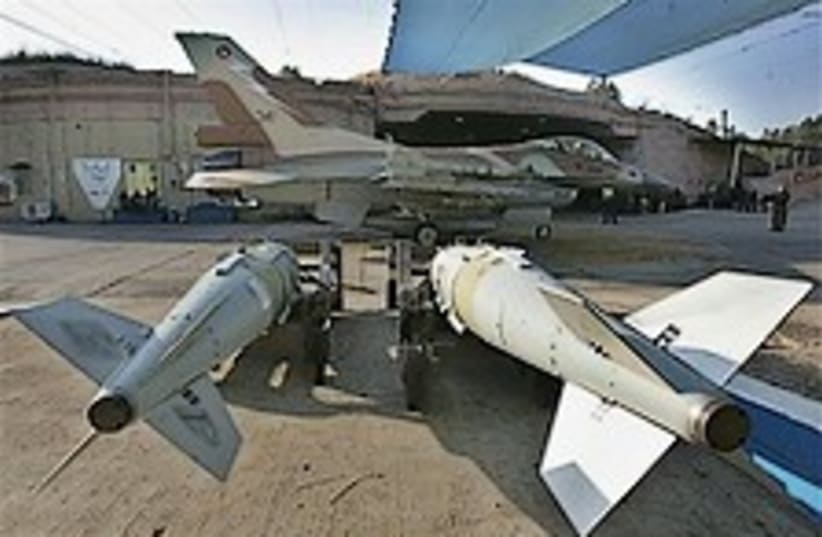Analysis: America's 10-year military aid package to Israel
The signing of the $30-billion, 10-year military aid package to Israel should put concerns to rest.
In the aftermath of last summer's war in Lebanon, when Israel failed to pulverize Hizbullah as so many - including the US administration - had hoped, voices of concern were raised, saying that the US would now be less inclined to back Israel because it had not proven as powerful a strategic asset as had been hoped or expected.
According to this logic, the US loves winners, and the fact that Israel did not emerge the decisive winner in last summer's battle lessened Israel's strategic value in Washington's eyes.
Yesterday's signing of the $30-billion, 10-year military aid package to Israel should put those concerns to rest. As a general rule, governments - like ordinary people - are reluctant to throw "good money after bad." If Washington viewed Israel as a liability following last year's war, it would not be investing $30 billion in its military over the next decade.
As Ron Dermer, Israel's economic attaché to Washington and a key force behind the agreement, said, "The most important part of the agreement is the message it sends to Israel's enemies that America remains fully committed to Israel's security."
That the US is now working on a $20-billion package deal to Saudi Arabia and five Gulf States complicates matters a bit. This now necessitates spelling out what Israel can buy, and what the Saudis can't, to maintain Israel's qualitative military edge. But the proposed sale to the Saudis does not dilute the message of the US's security commitment to Israel.
Israel negotiated its package with the US as a bilateral deal. The package was what Israel thought was necessary for its security. For Israel, this $30-billion package was the whole puzzle.
For the Americans, however, this aid package is just a piece of a much bigger puzzle - namely US policy throughout the Middle East, including how to eventually withdraw from Iraq and how to contain Iran. Other pieces in that large and complicated puzzle include the aid package to Saudi Arabia and a $13-billion, 10-year military aid package to Egypt as well.
While US Undersecretary of State Nicholas Burns said on Thursday that there was no link between the packages to Israel and the Saudis, it is clear that the package to Israel will make it much easier for Congress to swallow a military sale to Saudi Arabia, a country whose stock in the US is not necessarily on the rise following the heavy involvement of Saudi nationals in the 9/11 attacks, and - according to a Newsweek report this week - the fact that there are far more Saudi citizens involved in suicide attacks in Iraq than nationals from any other country.
Earlier this week, Israeli diplomatic officials said with certainty that if the US did not provide Israel with the package, the Saudi arms deal would not get off the ground.
Even with the Saudi deal, however, the US security commitment to Israel that the deal demonstrates is unmistakable and is based on two premises that have been mainstays in Washington since the Reagan Administration.
The first premise is that Israel will only make moves for peace - take risks for peace - if it feels that its security is ensured. And the other premise is that the Arab world will only come around to recognizing Israel as a given in the region if it realizes that the US will never abandon it.
Those who push for these types of huge aid packages, both in Israel and the US, are motivated in large part by a desire to send the message that while there may be policy differences at times between Jerusalem and Washington, US support is assured and transcends differences that emerge over tactical policy issues.
"We have not linked our support for the future security of Israel to any other issue," Burns made clear at Thursday's press conference. "It stands on its own. There is an intrinsic American interest in seeing Israel remain secure and strong in the Middle East."
Beyond the state-of-the-art weaponry that Israel will be able to buy with $30 billion, the package sends a message to both Israel and its enemies that on this matter, the US very much means what it says.
if(catID != 151){
var cont = `Take Israel home with the new
Jerusalem Post Store
Shop now >>
`;
document.getElementById("linkPremium").innerHTML = cont;
var divWithLink = document.getElementById("premium-link");
if(divWithLink !== null && divWithLink !== 'undefined')
{
divWithLink.style.border = "solid 1px #cb0f3e";
divWithLink.style.textAlign = "center";
divWithLink.style.marginBottom = "40px";
divWithLink.style.marginTop = "40px";
divWithLink.style.width = "728px";
divWithLink.style.backgroundColor = "#3c4860";
divWithLink.style.color = "#ffffff";
}
}
(function (v, i){
});

